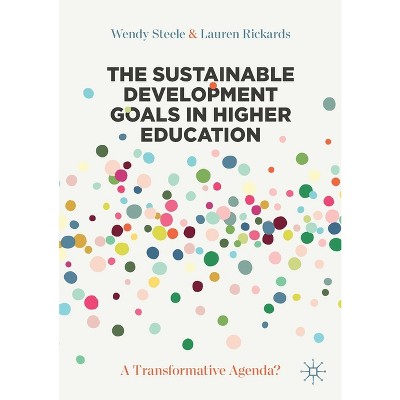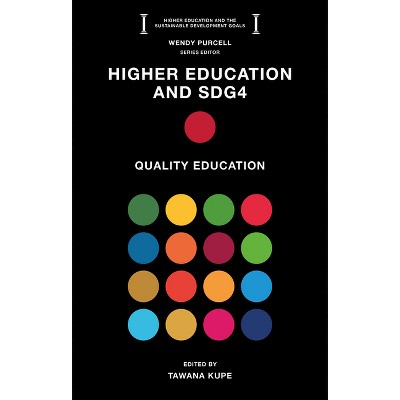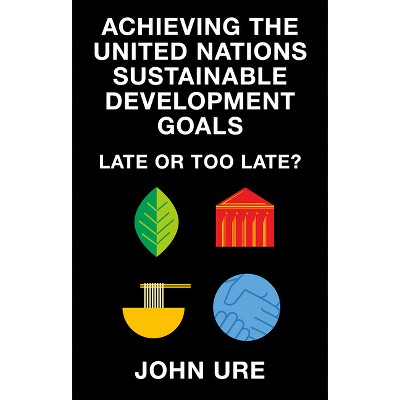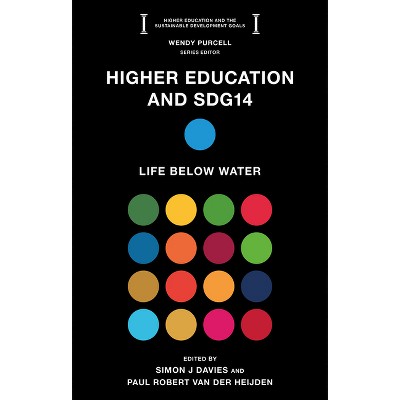International Norms, Normative Change, and the UN Sustainable Development Goals - by Noha Shawki (Hardcover)

$123.00 when purchased online
Target Online store #3991
About this item
Highlights
- This volume uses a theoretical framework that centers on norm evolution and change to study norms that underpin some of the Sustainable Development Goals (SDGs) included in the 2030 Agenda for Sustainable Development.
- About the Author: Noha Shawki is associate professor in the Department of Politics and Government at Illinois State University.
- 230 Pages
- Political Science, International Relations
Description
About the Book
This volume uses a theoretical framework that centers on norm evolution and change to study norms that underpin some of the Sustainable Development Goals (SDGs) included in the 2030 Agenda for Sustainable Development. Its chapters are written by authors with diverse background...Book Synopsis
This volume uses a theoretical framework that centers on norm evolution and change to study norms that underpin some of the Sustainable Development Goals (SDGs) included in the 2030 Agenda for Sustainable Development. Its chapters are written by authors with diverse backgrounds and in-depth knowledge of different areas of sustainable development.Review Quotes
An excellent volume that manages to explain processes of norm change and contestation in specific forums of the Post-2015 Agenda. Students, researchers, practitioners, and policymakers interested in the massive undertaking of formulating the SDGs and implications of the outcomes of that process will find it illuminating. Individual chapters in three key areas of environmental, social, and economic sustainability exemplify the application of a constructivist approach to better understand change in global governance. This volume is cautiously optimistic of the outcome of the new SDGs and their promise to radically advance international development policy, instead focusing primarily on the process of formulating the SDGs in the first place.
International Norms, Normative Change, and the Sustainable Development Goals provides an insightful look into how norms affected and were affected by negotiations towards a set of sustainable development goals (SDGs) for the post-2015 development agenda. This is valuable reading for anyone who wants to understand the development of the SDGs as well as the process through which norms both shape outcomes and evolve through negotiations for global policy cooperation. In keeping with the breadth of the SDGs themselves, the book explores normative processes within a wide range of policy issues regarding environmental, social, and economic sustainability, presented by experts on topics ranging from protecting the oceans and seas to attaining gender equality to trade and development. This book will definitely have a place on my Model UN syllabus!
The case studies contained in this volume provide useful histories of key Sustainable Development Goals, outlining the international debates that shaped them and the policy processes that determined their final form.
This edited work is well interwoven with each contribution and theme speaking to an aspect of the debate within constructivism and norms. The Editor of the volume, Noha Shawki, states: "The purpose of this volume is to assess the origins, nature, extent, and implications of normative change in the context of the 2030 Agenda for Sustainable Development." I believe the innovation in this contribution will enrich and add sophistication to the debate on norm contestation after norms have been institutionalized. The argument that norms don't remain stable after institutionalization is very well made and compelling. The comparison of Millennium Development Goals (MDG's) with Sustainable Development Goals (SDG's) analyzed through normative theory is illuminating. This volume is a cutting edge contribution that should be read by graduate students and faculty in International Relations, Global Environmental Politics, Development Economics and really everyone concerned with the welfare of the planet and transformative ideas.
Using insights from Constructivist theory, contributors analyze the emergence and diffusion of environmental, social, and economic sustainability norms. Reaching back beyond the MDGs to trace the initial articulation of these norms, this international group of scholars and practitioners record and assess the negotiation processes of the 17 SDGs or "global goals" in the 2030 Agenda for Sustainable Development. Engaging and informative, this anthology documents the entrepreneurial role of ordinary citizens and civil society advocates in global diplomacy and is essential reading for students and scholars of global governance and international development at all levels.
About the Author
Noha Shawki is associate professor in the Department of Politics and Government at Illinois State University.Dimensions (Overall): 9.1 Inches (H) x 6.2 Inches (W) x .9 Inches (D)
Weight: 1.05 Pounds
Suggested Age: 22 Years and Up
Number of Pages: 230
Genre: Political Science
Sub-Genre: International Relations
Publisher: Lexington Books
Theme: General
Format: Hardcover
Author: Noha Shawki
Language: English
Street Date: September 6, 2016
TCIN: 1005110833
UPC: 9781498533027
Item Number (DPCI): 247-03-2566
Origin: Made in the USA or Imported
Shipping details
Estimated ship dimensions: 0.9 inches length x 6.2 inches width x 9.1 inches height
Estimated ship weight: 1.05 pounds
We regret that this item cannot be shipped to PO Boxes.
This item cannot be shipped to the following locations: American Samoa (see also separate entry under AS), Guam (see also separate entry under GU), Northern Mariana Islands, Puerto Rico (see also separate entry under PR), United States Minor Outlying Islands, Virgin Islands, U.S., APO/FPO
Return details
This item can be returned to any Target store or Target.com.
This item must be returned within 90 days of the date it was purchased in store, shipped, delivered by a Shipt shopper, or made ready for pickup.
See the return policy for complete information.











